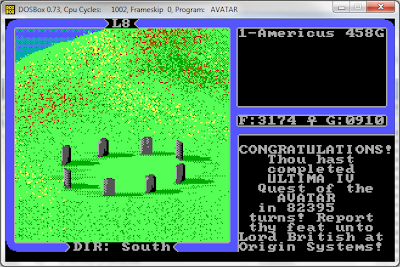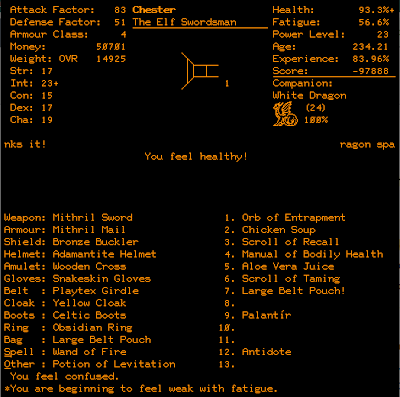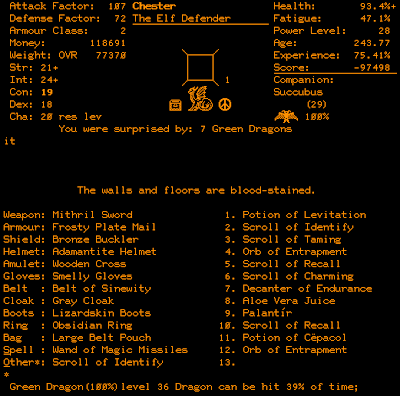From The CRPG Addict
This is the kind of story I like, because it’s an assemblage of circumstances that has probably never occurred to anyone else. I look for those in life. I may not be the world record holder in any sport or hobby, but there’s a decent chance that by the end of my life, I will have published more blog articles on CRPGs than anyone else alive. If that turns out not to be true, I’ll only need one other modest qualifier (“than any other Mainer”) to make it true. I guarantee that I’m the only person in the world to have my particular combination of jobs (if you include CRPG blogging as one of them). I don’t hold the record for the number of airline miles flown between 2010 and 2018, but I’ve got to be within the top 10%, and when you’re in the top 10%, you only need one or two additional circumstances to make yourself unique. It’s possible that I’m the record-holder out of Bangor, Maine, for instance.
My enthusiasm for unique experiences filters into CRPGs and probably explains why I like open-world sandbox games so much. I don’t like the idea that I’ve reached the end of a game in the exact same position and circumstances as everyone else who has ever played the game. When you can’t even name your character, this is particularly infuriating. Look at my recent review of Deadly Towers, for instance. How do you really know it was me playing that game? I could have taken those screen shots from anyone. At least Dragon Warrior displayed the first four letters of “Chester.”
These issues got me thinking about the peculiar trade-off that exists between player and character. Think of a game like Pac-Man. When a champion like Billy Mitchell achieves a perfect score, we don’t say, “Wow, you created a great character there. You put a lot into him.” The very statement is absurd; every player’s Pac-Man is the same as everyone else’s. Instead, all praise goes to the hands and eyes of the player himself. In contrast, when we watch the ways that various players have won the Mulmaster Beholder Corps battle in Curse of the Azure Bonds, we look for clues in the characters–their levels, their spells, their weapons, their movements. We’re aware that there’s a player behind it all, of course–perhaps a very intelligent and strategic one. But his success is slightly diffused by the imposition of the characters. We are aware that his strategy only “works” because of the allowances of the game. Perhaps most important, we are aware that we could have done the same thing, whereas no studying of his technique is likely to make most of us like Billy Mitchell.
It is for these reasons that I don’t think it’s really possible to be “good at” a game like Skyrim. Experienced, sure. Patient, definitely. But “good”–what does that even mean? Early in its existence, some players proudly posted images on Reddit of their characters clad in leather armor and wielding pick-axes (possibly the worst weapon in the game) killing dragons. I thought it was silly. Either the game has enough flexibility to allow you to do such a thing or it doesn’t. It says nothing about your skill as a player that you were able to do it except that you were willing to use the game’s resources to grind, or enchant that pick-axe, or improve that armor, or carry and drink a hundred potions, or whatever you did to make it possible.
I just bought Irene the Myst 25th anniversary collection for Christmas. That is a “good at” game. A player that possesses the strength of puzzle-solving to blaze his way to the end without any spoilers is an impressive player. But his end-game screenshot is the same as everyone else and the “character” of the game is essentially invisible, a no-one, a ghost.
 |
| In many modern games, “uniqueness” extends quite literally to the character’s appearance. |
In case it’s not clear, I’m not particularly interested in being “good at” CRPGs. I don’t play them for competitive reasons. I play them to enjoy the strategy, tactics, world-building, plots, and sense of character development. I like a challenge, but only a modest one–a temporary bump in a game that, because of its very nature (particularly because of reloading), you’re almost certain to eventually overcome.
Many people prize the opposite. I suppose even I do, in different circumstances. The value of most competitive games is that everyone’s playing the same game under the same circumstances, with no real imposition of “character” between the player and the performance. A king in chess isn’t a “character”; he’s just a piece. You don’t give him a name, and he doesn’t acquire new abilities as he defeats pawns and levels up. When he moves to take a rook, there are no probabilities associated with the encounter. When he wins, all glory goes to the player who moves him.
When my king reaches the end of a game, on the other hand, I want him to be my king–a unique character that no other player has won with. I want my endgame screenshots to look different from everyone else’s. And in those screenshots you should be able to tell something about how I played the game. Was I careful or daring? Did I rely on brains or brawn? Did I favor equipment or skills? What role-playing choices did I make along the way?
To me, some of the worst RPGs are closer to chess. Your “character” is just a gambit that you’ve moving across the screen, offering you no sense of connection or identity. These are essentially arcade games with a few nods to RPG mechanics. We’ve seen a million of them: Caverns of Freitag, Gateway to Apshai, Sword of Kadash, Sword of Fargoal. Even worse is when the game offers RPG-style inventory and leveling, but at fixed intervals along a linear plot, so that “character development” is just an illusion and everyone does reach the end the same as everyone else.
The best RPGs, however, offer plenty of opportunities to make your character your own:
- Name
- Selection of race, sex, alignment, and class
- Attributes
- Skills and talents
- Inventories, especially those with multiple slots
- NPC interaction, dialogue, and role-playing choices
- Choice of what order in which to do quests and side-quests
- Ability to grind, or not (only meaningful without artificially low level caps)
- Customization of character appearance
- Statistics, achievements, and trophies
The multiplication of these various factors means that many modern RPGs feature characters as unique as the humans who create them, finally achieving some of the sense of ownership and identification that tabletop RPGs allowed from the outset.
 |
| Every player may have had to do exactly what I did to win Ultima IV, but at least my name and the number of turns are unique. |
Camelot is an early game, and thus not as advanced in the originality of its characters. But of the single-player PLATO games, it comes the furthest. When I play it, I do not feel as if I am feeding so many characters into a meat grinder, as I did with The Dungeon, The Game of Dungeons, and Orthanc. Its allowances for stealth, magic, and multiple fighting styles, paired with the strategic nature by which you must explore dungeon exploration, create as close to a unique experience as anything we’re going to get for many years. If nothing else, the combination of items in the 13 inventory slots likely creates characters for each player that no one else has ever played.
I’ve put about 12 hours into the game since the last Camelot entry and I’ve gotten a lot more powerful–enough to take on dungeon Level 5 with relative ease–but it’s still slightly frustrating how long its’ taking to finish the game, much more so because I keep dying and resetting my score back to -99,999. But I recognize that it was designed for different players in different circumstances.
There was an interesting moment the other night where creator Josh Tabin happened to be logged into the system at a moment that I got stuck. I had teleported into a section of Level 4 that offered only one exit: a downward chute. Unfortunately, I had taken a Potion of Levitation upon beginning the expedition (you always want to use Scrolls of Protection, Potions of Cepacol, and Potions of Levitation at the outset of each expedition if you have them). It turns out that Levitation stops you from using chutes, even deliberately. The condition doesn’t wear off until you return to town. There were no other exits from the area, and I was out of Scrolls of Recall. The only solution I could come up with is to wait until the turn of every hour, when the dungeon levels respawn, and kill everything in the half-dozen rooms I had access to, hoping to get a Scroll of Recall at some point. But since Josh was there, I informed him of my trouble and he opened a secret door for me, then spent some time patching the game so that even if you’re under the effect of levitation, you can manually choose to take a chute.
Other things about the game since I last wrote:
- As I previously mentioned, the game occasionally gives you a specific monster to kill before it will let you level up. It’s very erratic. I had a period from roughly Level 10 to 20 where I got a quest every level. Then I didn’t get any at all between Levels 20 and 29.
- A “Palantir” tells you at what level you can find the object of your quest. If you’re already on that level, it tells you the specific coordinates. Of course, if the hour turns while you’re still seeking the quest creature, everything resets.
- As you move downward, enemies get harder but rewards get better. Some of the magic item rewards are awesome. I’ve had a couple of Wands of Fire that completely clear out rooms in one turn. The problem is how frequently they require recharging and the expense thereof. The game’s economy is still excellent. I make a lot of tough choices between leveling up, recharging, and purchasing new items.
- It turns out that items don’t have a fixed number of charges but rather a small probability of running out within any given use. High intelligence seems to lower this chance.
- Some of the best items that you can find increase your attributes. Manuals and tomes increase them permanently by one point while various potions increase them temporarily for several points. I have maxed out my strength, intelligence, and constitution with these items, and I must be close on the other two.
 |
| A Manual of Bodily Health raises my constitution. |
- Scrolls of Taming, Orbs of Entrapment, and Wands of Charming all work on different creatures. I’ve learned that when I lose a companion (or one leaves), I want to head down to the lowest dungeon level on which I can survive to start hunting for another. About six hours into this session, I was able to charm a succubus, and it’s remained with me ever since–an extremely powerful ally.
- I probably mentioned this earlier, but there are special rooms on each level that the creator calls “stud rooms.” They feature enemies 2-3 levels harder than the normal ones on the same level, but with rewards 2-3 times greater. Any new expedition needs to begin with clearly the stud rooms that you know you can clear.
 |
| In one of the “stud rooms.” Seven green dragons are a little much for me. The Scroll of Identification gives grim odds. |
- There’s a magic item called a “Tardis” that resets the dungeon in between the normal hourly resets. It allows you to quickly hit the stud rooms multiple times in a row until it runs out of magic. It’s incredibly useful but back in the day when there were multiple players hitting the dungeon at the same time, it must have been very annoying for some of them.
The two players on the leaderboard who have won the game both have Level 60 characters, so I assume that’s the game’s level cap. Thus, I’m halfway there. I probably won’t have much more to say about Camelot until I win, so hopefully I can get it done this week while I also wrap up Challenge of the Five Realms. I’ll say this for Camelot: it’s the first PLATO game that I’ve enjoyed lingering with, rather than blasting through it just to document its historical value.
Time so far: 40 hours
Original URL: http://crpgaddict.blogspot.com/2019/12/camelot-what-makes-us-unique.html

